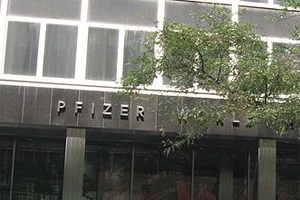
Germany’s Merck KGaA has enlisted the aid of Pfizer to accelerate the development of its PD-L1 inhibitor programme, as both firms try to close the gap with the leading companies in the field.
Under the terms of the $2.85bn collaboration the two companies will jointly develop Merck’s lead anti-PD-L1 drug MSB0010718C – currently in phase I and II trials – both as a monotherapy and in combination with Pfizer’s portfolio of small-molecule and antibody-based cancer drugs and other Merck compounds.
The broad-ranging alliance could see the start of “up to 20 … immuno-oncology clinical development programmes in 2015”, including six phase II and III registration trials, said the two firms in a statement.
The first drugs in the PD-L1 and PD-1 inhibitor class are already on the market, with Bristol-Myers Squibb’s Opdivo (nivolumab) approved for melanoma in Japan and US company Merck & Co’s Keytruda (pembrolizumab) on the US market for the same cancer. Both drugs are also being developed for non-small cell lung cancer (NSCLC) as well as many other cancer indications.
MSB0010718C is in a phase I trial involving patients with NSCLC and ovarian cancer, among others, and also in a phase II trial involving patients with a rare form of skin cancer known as Merkel cell carcinoma.
While Pfizer has a number of oncology projects in its pipeline, the company’s in-house PD-1 inhibitor is in very early development and it has relied instead on partnering to build a position in the much-anticipated new treatment class.
Earlier this year, Pfizer signed an agreement with Merck & Co to test Keytruda alongside Xalkori (crizotinib) in patients with NSCLC, breast cancer and melanoma candidate palbociclib and Inlyta (axitinib) in patients with advanced renal cell carcinoma, as well as with anti-CD-137 monoclonal PF-05082566l.
Pfizer is paying $850m upfront for a share of Merck’s PD-L1 programme, with another $2bn in the offing if various clinical and regulatory milestones are met. The two companies will share development costs and split revenues from the alliance equally.
Separate from the PD-1/PD-L1 programme, Merck will co-promote Xalkori in the US and “several other key markets”.
The chief executive of Merck’s biopharma division Merck Serono, Belén Garijo, said allying with Pfizer would give the company “an early entry into the US oncology market” and would also “strengthen our existing oncology business in several other important global markets”.
The annual market for PD-1 and PD-L1 inhibitors could eventually be worth tens of billions of dollars in the coming years, according to analysts.




